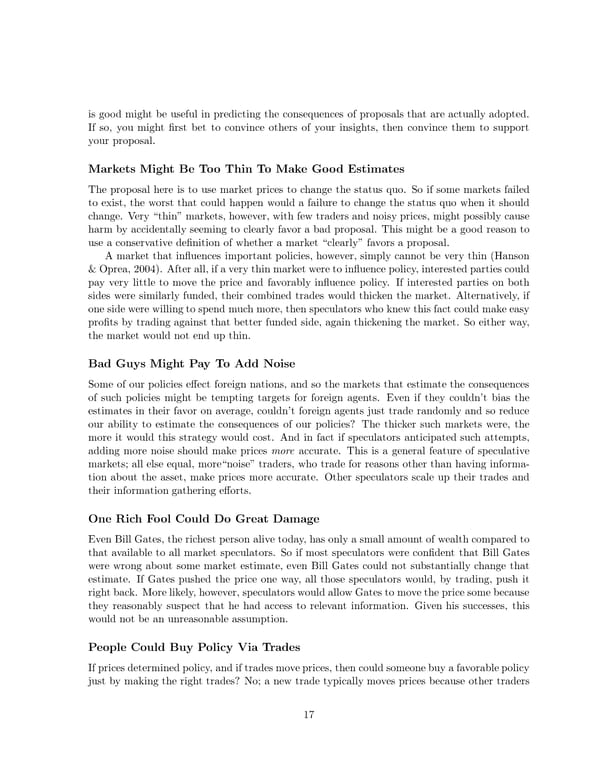is good might be useful in predicting the consequences of proposals that are actually adopted. If so, you might first bet to convince others of your insights, then convince them to support your proposal. Markets Might Be Too Thin To Make Good Estimates The proposal here is to use market prices to change the status quo. So if some markets failed to exist, the worst that could happen would a failure to change the status quo when it should change. Very “thin” markets, however, with few traders and noisy prices, might possibly cause harm by accidentally seeming to clearly favor a bad proposal. This might be a good reason to use a conservative definition of whether a market “clearly” favors a proposal. Amarket that influences important policies, however, simply cannot be very thin (Hanson &Oprea, 2004). After all, if a very thin market were to influence policy, interested parties could pay very little to move the price and favorably influence policy. If interested parties on both sides were similarly funded, their combined trades would thicken the market. Alternatively, if one side were willing to spend much more, then speculators who knew this fact could make easy profits by trading against that better funded side, again thickening the market. So either way, the market would not end up thin. Bad Guys Might Pay To Add Noise Some of our policies effect foreign nations, and so the markets that estimate the consequences of such policies might be tempting targets for foreign agents. Even if they couldn’t bias the estimates in their favor on average, couldn’t foreign agents just trade randomly and so reduce our ability to estimate the consequences of our policies? The thicker such markets were, the more it would this strategy would cost. And in fact if speculators anticipated such attempts, adding more noise should make prices more accurate. This is a general feature of speculative markets; all else equal, more“noise” traders, who trade for reasons other than having informa- tion about the asset, make prices more accurate. Other speculators scale up their trades and their information gathering efforts. One Rich Fool Could Do Great Damage Even Bill Gates, the richest person alive today, has only a small amount of wealth compared to that available to all market speculators. So if most speculators were confident that Bill Gates were wrong about some market estimate, even Bill Gates could not substantially change that estimate. If Gates pushed the price one way, all those speculators would, by trading, push it right back. More likely, however, speculators would allow Gates to move the price some because they reasonably suspect that he had access to relevant information. Given his successes, this would not be an unreasonable assumption. People Could Buy Policy Via Trades If prices determined policy, and if trades move prices, then could someone buy a favorable policy just by making the right trades? No; a new trade typically moves prices because other traders 17
 Shall We Vote on Values, But Bet on Beliefs? Page 18 Page 20
Shall We Vote on Values, But Bet on Beliefs? Page 18 Page 20